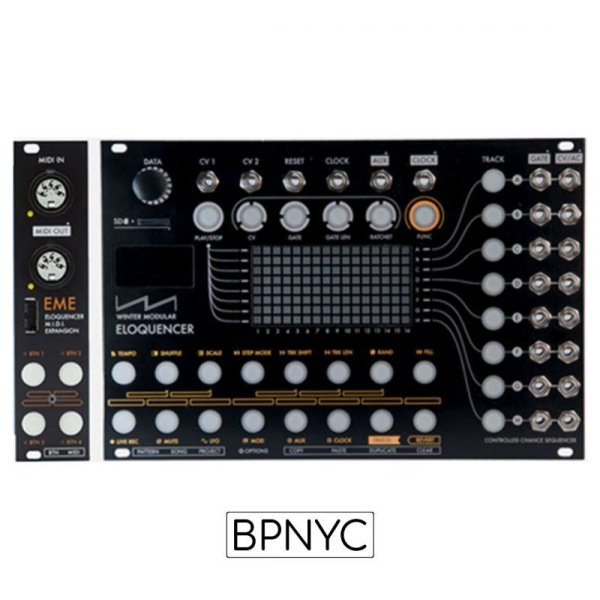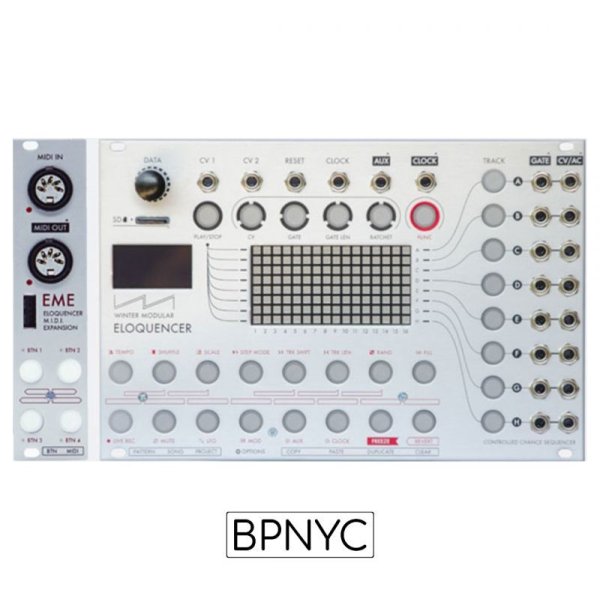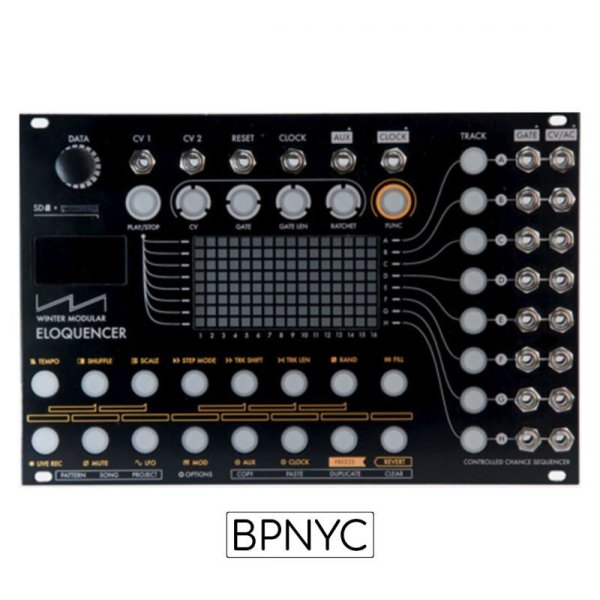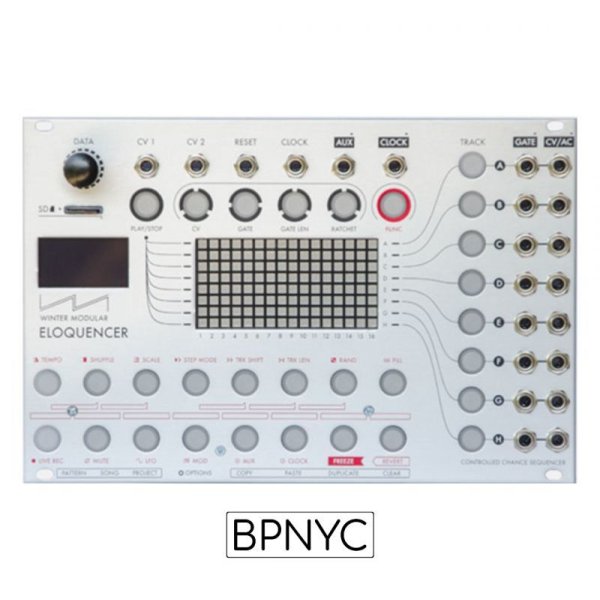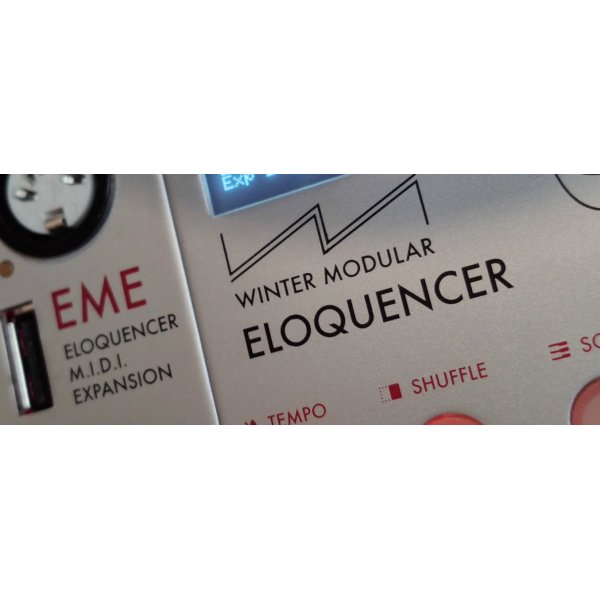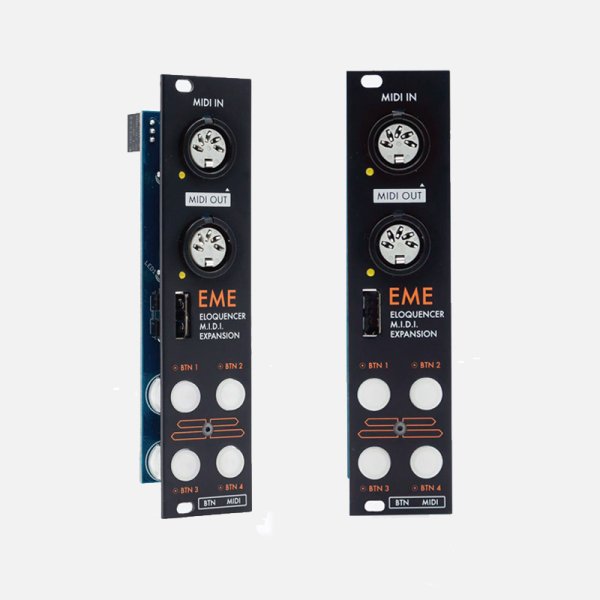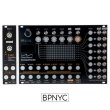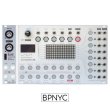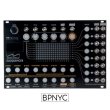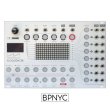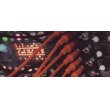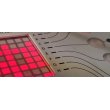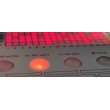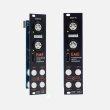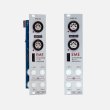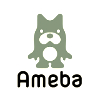商品詳細
Winter Modular Eloquencer + EME セット
販売価格はお問い合わせください。
- Tweet
商品詳細
ELOQUENCER
Eloquencerは、パフォーマンスと作曲の両方のツールとして使用できる強力で多用途のユーロラックシーケンサーです。 直感的で使いやすく、すばやく編集できるように設計されています。 「制御されたチャンス」の概念に基づいて構築されています。 これはランダム性がいつどこで発生し、このランダム性がシーケンスにどの程度影響するかを決定できることを意味します。 16ステップの配置で8トラックのCVとゲートを備えていますが、より多くの小節数またはチェーンパターンを定義して、それぞれ256ステップの複数のソングパーツを構築できます。
EME
EME(Eloquencer MIDI Expansion)は、Eloquencerの完璧なコンパニオンです。MIDIデバイスと同期する機能を追加し、MIDIインターフェースでEloquencerのほとんどのパラメーターを制御し、EloquencerトラックからMIDI音声を生成し、MIDI信号をユーロラックの世界に変換します。
The Eloquencer is a powerful and versatile eurorack sequencer that can be used both as a performance and a composition tool. It’s designed to be intuitive, easy to use, and quick to edit. It has been built around the “controlled chance” concept. This means you can decide when and where there will be randomness and how much this randomness will affect your sequences. It features 8 tracks of CVs and Gates in a 16 step disposition, but with the ability to define larger bar counts or chaining patterns to build multiple song parts of 256 steps each.
EME (Eloquencer MIDI Expansion) is the perfect companion for the Eloquencer, adding capabilities to sync with MIDI devices, control most of the eloquencer parameters with MIDI interfaces, generating MIDI voices from the eloquencer tracks, and converting MIDI signals to the eurorack world.
Description
MAIN FEATURES
Gate probability independent for each step or track.
CV, CV Variation Probability, and CV Variation Range adjustable for each step or track.
Gate Lenght, Gate Length Variation Probability, and Gate Variation Range adjustable for each step or track.
Ratcheting Type, Ratcheting Probability, and Ratcheting Variation Probability adjustable for each step or track.
Tempo and shuffle adjust
CV Outputs quantizable in tone / scale
Different step modes ( forward, backward, pendulum, random) independent for each track and pattern.
Track length independent for each track and pattern
Track shifting independent for each track or a group of tracks.
Fill in mode (pressing the track buttons will fill all the gates of the desired tracks).
Quantized (time and pitch) Live recording (Cvs and Gates)
Free play mode (using the step buttons keyboard)
Song Mode (64 songs parts can be build, each song part contains a sequence of 16 patterns; a song can be build chaining up to 256 song parts)
LFO Mode (not available in the first release)
Mod Mode (not available in the first release)
Mute Mode
Randomize function to create a pattern, or do partial changes
Cvs and Gates can be unlinked to have two independent channels
CV inputs can be assigned to many parameters ( Step and probabilities, Mute, Fill in, track shift…)
Duplicate function to create different patterns while editing in step modes.
Freeze and revert function – Create a screenshot of your pattern, modify it, and go back to the previous freezed pattern
Master track concept – The change of pattern or the synchronization of tracks to its first step, occurs when the master trach reach its end. The master track can be a track, or an internal clock that can be configurated between 1 and 64 steps.
Release Reset track – A track can be release from its relation to the master track, so it won’t reset everytime the master track reach its end.
Integrated microSD card reader to save projects, do back ups of your projects, and have different cards with different sets.
Open Source – the program can be modified using the Arduino IDE and a USB cable. (code will not be available in first release for aesthetic reasons)
INPUTS AND OUTPUTS
8 V/oct CV Output
8 Trigger / Gate Output
Reset Input
External Clock Input (configurable. i.e: can be used as a clock divider / multiplier)
Accent Output (configurable)
Clock Output (configurable. i.e: can be used as a clock divider / multiplier)
2 CV Input (assignable to different parameters)
Description
MAIN FEATURES
IN / OUT
DIN-5 MIDI Input, DIN-5 MIDI Output, USB Host.
BUTTONS
4 freely assignable buttons. They can be assigned to:
Next/previous pattern
Next/previous part
Direct access to Pattern mode, Play parts, Duplicate, Project, Gate REC, CV Key REC, MIDI key REC, Free Play…
Save current project
Random 1 to 3 layers of selected track
Reset LFO of selected track
On/Off LFO of selected track
Freeze
Revert
Fill A to H or selected track
Mute A to H or selected track
DJ Nudge FWD/BCK fine/coarse
MIDI CLOCK
Eloquencer can receive 24ppqn sync from MIDI device from its DIN-5 MIDI Input, and can send 24ppqn MIDI clock through its DIN-5 MIDI out.
When working as ‘internal’ it will send the internal clock to the MIDI output.
When working as ‘external’ will send the eurorack incoming clock to the MIDI output transformed into 24ppqn.
MIDI OUT
The Eloquencer tracks can be independently assigned to:
– Voice events (note on/off, velocity, ch pressure…) For example Track A can be assigned to Channel 1 Note on/off and Track B can be assigned to Channel 1 Velocity, so track A gates and CV control Channel 1 notes and pitch, and track B controls Channel 1 Velocity.
– Control Change (CC)
– Program Change (PC)
The gate and CV output will work as usual when a MIDI OUTPUT is assigned, so voices can be doubled using the modular and an external synth.
There’s a particular execution order for MIDI out events, so the first to be launched is the Program Change, followed by the CC and then the voice events. This way, we can launch program changes before the note on message is received allowing preset changes for each step.
MIDI IN
Both, the DIN-5 MIDI in and the USB can be used to change eloquencer parameters using controllers or to introduce notes in REC MODE using a keyboard.
There are 3 different groups of controls associated to MIDI channels:
– Channel : 8 MIDI channels to control parameters of specific tracks from A to H
– Global : 1 MIDI channel to control Global parameters.
– Focus: 1 MIDI channel to control the parameters of the currently selected track (track in focus). That means that if Track A is selected and we send CC 38, we will be shifting track A, but if we select track B and we send the same CC 38, we will be shifting track B.
When using the USB host input, the EME can send feedback information in case the controller that is being used has LEDs to be updated.
There is a big amount of eloquencer parameters that can be controlled using an external MIDI interface / controller. For example:
Non-destructive track parameters addition/subtraction (CV, CVP, CVR, GL GLP, R…)
Track length
Step mode / Step mode DIV / Step mode REP
Track shift
LFO on/off / Type / Length / amplitude.
Fill
Mute
Random
CV Gate link
Scale group and root
Tempo
DJ Nudge
Shuffle
Clock out
Play / Stop
Direct access to modes (Pattern, Project, Live REC…)
MIDI INTERFACE
A MIDI Channel can be assigned to an Eloquencer Track, so the gate and CV outputs will stop listening to what is sequenced and start listening all note on/off messages coming from the chosen MIDI channel.
Eloquencerは、パフォーマンスと作曲の両方のツールとして使用できる強力で多用途のユーロラックシーケンサーです。 直感的で使いやすく、すばやく編集できるように設計されています。 「制御されたチャンス」の概念に基づいて構築されています。 これはランダム性がいつどこで発生し、このランダム性がシーケンスにどの程度影響するかを決定できることを意味します。 16ステップの配置で8トラックのCVとゲートを備えていますが、より多くの小節数またはチェーンパターンを定義して、それぞれ256ステップの複数のソングパーツを構築できます。
EME
EME(Eloquencer MIDI Expansion)は、Eloquencerの完璧なコンパニオンです。MIDIデバイスと同期する機能を追加し、MIDIインターフェースでEloquencerのほとんどのパラメーターを制御し、EloquencerトラックからMIDI音声を生成し、MIDI信号をユーロラックの世界に変換します。
The Eloquencer is a powerful and versatile eurorack sequencer that can be used both as a performance and a composition tool. It’s designed to be intuitive, easy to use, and quick to edit. It has been built around the “controlled chance” concept. This means you can decide when and where there will be randomness and how much this randomness will affect your sequences. It features 8 tracks of CVs and Gates in a 16 step disposition, but with the ability to define larger bar counts or chaining patterns to build multiple song parts of 256 steps each.
EME (Eloquencer MIDI Expansion) is the perfect companion for the Eloquencer, adding capabilities to sync with MIDI devices, control most of the eloquencer parameters with MIDI interfaces, generating MIDI voices from the eloquencer tracks, and converting MIDI signals to the eurorack world.
Description
MAIN FEATURES
Gate probability independent for each step or track.
CV, CV Variation Probability, and CV Variation Range adjustable for each step or track.
Gate Lenght, Gate Length Variation Probability, and Gate Variation Range adjustable for each step or track.
Ratcheting Type, Ratcheting Probability, and Ratcheting Variation Probability adjustable for each step or track.
Tempo and shuffle adjust
CV Outputs quantizable in tone / scale
Different step modes ( forward, backward, pendulum, random) independent for each track and pattern.
Track length independent for each track and pattern
Track shifting independent for each track or a group of tracks.
Fill in mode (pressing the track buttons will fill all the gates of the desired tracks).
Quantized (time and pitch) Live recording (Cvs and Gates)
Free play mode (using the step buttons keyboard)
Song Mode (64 songs parts can be build, each song part contains a sequence of 16 patterns; a song can be build chaining up to 256 song parts)
LFO Mode (not available in the first release)
Mod Mode (not available in the first release)
Mute Mode
Randomize function to create a pattern, or do partial changes
Cvs and Gates can be unlinked to have two independent channels
CV inputs can be assigned to many parameters ( Step and probabilities, Mute, Fill in, track shift…)
Duplicate function to create different patterns while editing in step modes.
Freeze and revert function – Create a screenshot of your pattern, modify it, and go back to the previous freezed pattern
Master track concept – The change of pattern or the synchronization of tracks to its first step, occurs when the master trach reach its end. The master track can be a track, or an internal clock that can be configurated between 1 and 64 steps.
Release Reset track – A track can be release from its relation to the master track, so it won’t reset everytime the master track reach its end.
Integrated microSD card reader to save projects, do back ups of your projects, and have different cards with different sets.
Open Source – the program can be modified using the Arduino IDE and a USB cable. (code will not be available in first release for aesthetic reasons)
INPUTS AND OUTPUTS
8 V/oct CV Output
8 Trigger / Gate Output
Reset Input
External Clock Input (configurable. i.e: can be used as a clock divider / multiplier)
Accent Output (configurable)
Clock Output (configurable. i.e: can be used as a clock divider / multiplier)
2 CV Input (assignable to different parameters)
Description
MAIN FEATURES
IN / OUT
DIN-5 MIDI Input, DIN-5 MIDI Output, USB Host.
BUTTONS
4 freely assignable buttons. They can be assigned to:
Next/previous pattern
Next/previous part
Direct access to Pattern mode, Play parts, Duplicate, Project, Gate REC, CV Key REC, MIDI key REC, Free Play…
Save current project
Random 1 to 3 layers of selected track
Reset LFO of selected track
On/Off LFO of selected track
Freeze
Revert
Fill A to H or selected track
Mute A to H or selected track
DJ Nudge FWD/BCK fine/coarse
MIDI CLOCK
Eloquencer can receive 24ppqn sync from MIDI device from its DIN-5 MIDI Input, and can send 24ppqn MIDI clock through its DIN-5 MIDI out.
When working as ‘internal’ it will send the internal clock to the MIDI output.
When working as ‘external’ will send the eurorack incoming clock to the MIDI output transformed into 24ppqn.
MIDI OUT
The Eloquencer tracks can be independently assigned to:
– Voice events (note on/off, velocity, ch pressure…) For example Track A can be assigned to Channel 1 Note on/off and Track B can be assigned to Channel 1 Velocity, so track A gates and CV control Channel 1 notes and pitch, and track B controls Channel 1 Velocity.
– Control Change (CC)
– Program Change (PC)
The gate and CV output will work as usual when a MIDI OUTPUT is assigned, so voices can be doubled using the modular and an external synth.
There’s a particular execution order for MIDI out events, so the first to be launched is the Program Change, followed by the CC and then the voice events. This way, we can launch program changes before the note on message is received allowing preset changes for each step.
MIDI IN
Both, the DIN-5 MIDI in and the USB can be used to change eloquencer parameters using controllers or to introduce notes in REC MODE using a keyboard.
There are 3 different groups of controls associated to MIDI channels:
– Channel : 8 MIDI channels to control parameters of specific tracks from A to H
– Global : 1 MIDI channel to control Global parameters.
– Focus: 1 MIDI channel to control the parameters of the currently selected track (track in focus). That means that if Track A is selected and we send CC 38, we will be shifting track A, but if we select track B and we send the same CC 38, we will be shifting track B.
When using the USB host input, the EME can send feedback information in case the controller that is being used has LEDs to be updated.
There is a big amount of eloquencer parameters that can be controlled using an external MIDI interface / controller. For example:
Non-destructive track parameters addition/subtraction (CV, CVP, CVR, GL GLP, R…)
Track length
Step mode / Step mode DIV / Step mode REP
Track shift
LFO on/off / Type / Length / amplitude.
Fill
Mute
Random
CV Gate link
Scale group and root
Tempo
DJ Nudge
Shuffle
Clock out
Play / Stop
Direct access to modes (Pattern, Project, Live REC…)
MIDI INTERFACE
A MIDI Channel can be assigned to an Eloquencer Track, so the gate and CV outputs will stop listening to what is sequenced and start listening all note on/off messages coming from the chosen MIDI channel.
MANUAL
MANUAL
*** お問い合わせ&予約受付中 ***
当店で扱っている各商品は大量生産ではありません。 メーカーにも在庫に限りがあります...
確実に欲しい商品に関しては早めに予約/在庫確認する事をおすすめします...
尚、お取り寄せをしなければいけない場合の納期は大抵3~5週間位と思っていただければ幸いです。
